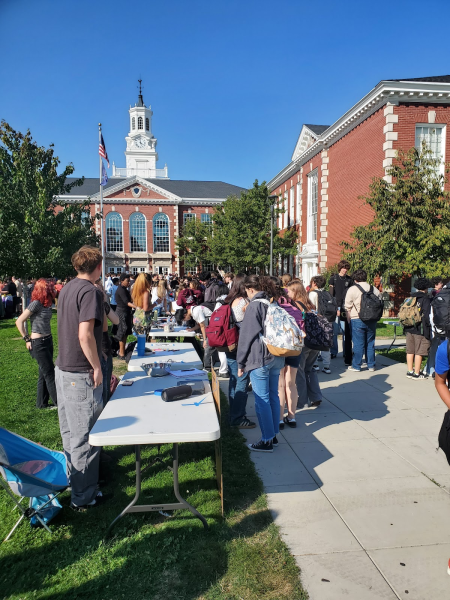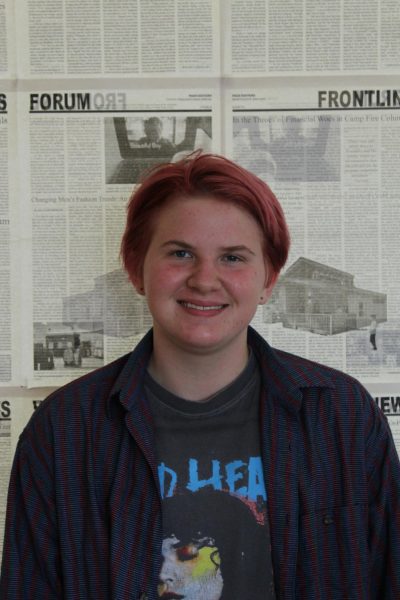
Clubs play an integral role in the school community. Whether they’re an affinity group bringing together people of similar backgrounds, a structured organization with goals to accomplish, or a place for students to socialize during lunch, clubs are special places for the students who attend them. They are small, niche communities within our greater school, or at least that’s how Cassie Betancourt sees it. Betancourt is the extended day coordinator for Students Uniting Neighborhoods (SUN), the organization that oversees after-school activities, including clubs, and provides resources to students and families. She explains that clubs give students “community within itself, and opportunities [to meet] new people,” especially for younger students.
There were over 40 clubs offered at Franklin last year, but if you are unable to find one suited to your interests, you can always start your own. Jordan Thompson, current senior, found the process for starting his club — the Rocket Club, which is now the Franklin Rocket Propulsion Lab — “surprisingly easy. All I had to do was find some people who were interested, fill out a club form, and send it to the SUN room to get accepted.”
The form referenced is the club creation form, which can be found in the SUN office inside Franklin in room SS-110. It requires simple information, including the mission of your club and the signature of your chosen staff advisor. This can be any adult at the school who agrees to be present at and oversee club meetings; they can also help run the club or offer ideas.
Eve Thompson, a Franklin junior, co-founded the Academic Mental Health Club last year — along with students Clementine Di Bartolo, Rusty MacKenzie, and Emma York — because she was feeling “very bogged down with all [her] APs and Mock Trial,” and saw similar struggles within her friends. She says she was learning about stress relief in health class and decided to ask her teacher, Brian Cape, to be the advisor. On the subject of finding a club advisor, she says, “The biggest thing that I would recommend is having your teacher involved, because … if they’re willing to do that for you, [they’re] probably going to have some input and some ideas, and they’re probably good ones.”
To start official meetings, SUN has to approve the club forms; if you start a club later into the school year, it can take a long time before you can start recruiting official members because of the time required to process the forms. If you are thinking of starting a club, prioritize getting an advisor and paperwork turned in as early as possible. The Academic Mental Health Club took about a month to start up, but Eve Thompson and the other student leaders still met at lunch frequently to discuss plans. For Emma York, a current junior who was inspired to start a poetry club after competing in the Verselandia! Youth Poetry Slam with her friend last spring, the process will move a lot faster. On Sep. 4 at the SUN Club Creation Workshop, she didn’t yet have a club advisor, but was already making plans for the Fall Club Fair, an annual event — this year’s Fall Club Fair was on Sep. 18 — where students can sign up for and learn about clubs.
York says that “the way to get people to join clubs is to have candy.” This certainly doesn’t hurt, but even without the enticement of candy, club leaders can still find membership. She says, “People are generally more interested in things than you think they are.” If you’re having trouble during any step of this process, other students and staff exist as a resource. York’s poetry club will bring together students interested in writing and revising their own poetry, regardless of different skill levels and backgrounds. York explains that she “started doing poetry in speech and debate [about three years ago], and gained enough skills that [she] got comfortable,” and decided to do slam poetry, which “ha[d] been a dream of [hers] since before [she] started even writing poetry.” Hopefully, the poetry club can inspire this dream in others.
There are many duties to starting a club and being its representative, such as ensuring the club has enough momentum to keep meeting throughout the year. Betancourt says that “there [are] a lot of clubs that just meet up and [then] freeze up when they don’t.” It’s the job of the student club leaders to create an agenda in advance to help combat this. Forms required in order to start a club include the shared space agreement to use a teacher’s classroom and background checks for any involved adults not employed by the school. There are also Student Senate meetings for club leaders to attend, where they can meet members of other clubs and help to plan schoolwide events. Jordan Thompson would summarize his job as “attend[ing] Student [Senate] meetings, organiz[ing] club events, and provid[ing] certain resources and materials for everyone to use.” It’s not the easiest job, but it can be very rewarding if you have the time. Jordan Thompson encourages others to follow in his footsteps. “If you’re thinking of starting a club, go do it,” He says. “There are [people who] will have an interest in whatever it is you’re trying to put together … [and] making a club is a really good way to meet people with similar niches and make new friends.”





































